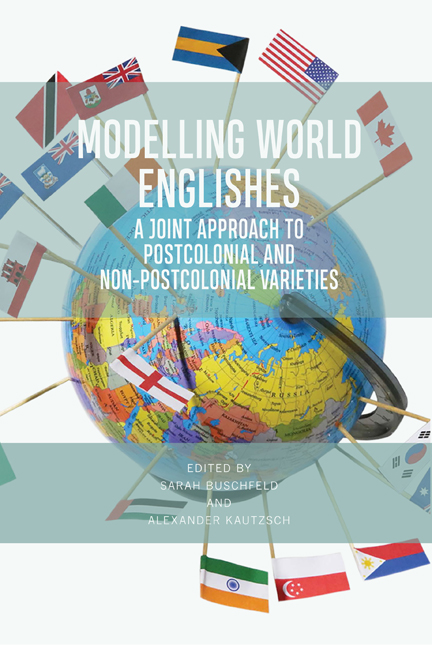Book contents
- Frontmatter
- Contents
- List of Figures and Tables
- List of Contributors
- Foreword
- 1 Introduction
- 2 English in England: The Parent Perspective
- 3 English in Namibia: Multilingualism and Ethnic Variation in the Extra- and Intra-territorial Forces Model
- 4 English in the United Arab Emirates: Status and Functions
- 5 English in India: Global Aspirations, Local Identities at the Grassroots
- 6 English in Singapore: Two Issues for the EIF Model
- 7 English in the Philippines: A Case of Rootedness and Routedness
- 8 English in South Korea: Applying the EIF Model
- 9 English in Japan: The Applicability of the EIF Model
- 10 English in Australia – Extra-territorial Influences
- 11 English in North America: Accounting for its Evolution
- 12 English in The Bahamas and Developmental Models of World Englishes: A Critical Analysis
- 13 Standard English in Trinidad: Multinormativity, Translocality, and Implications for the Dynamic Model and the EIF Model
- 14 Englishes in Tristan da Cunha, St Helena, Bermuda and the Falkland Islands: PCE, non-PCE or both? Blurred Boundaries in the Atlantic
- 15 English in Ireland: Intra-territorial Perspectives on Language Contact
- 16 English in Gibraltar: Applying the EIF Model to English in Non-Postcolonial Overseas Territories
- 17 English in Ghana: Extra- and Intra-territorial Forces in a Developmental Perspective
- 18 Synopsis: Fine-tuning the EIF Model
- Index
17 - English in Ghana: Extra- and Intra-territorial Forces in a Developmental Perspective
Published online by Cambridge University Press: 24 September 2020
- Frontmatter
- Contents
- List of Figures and Tables
- List of Contributors
- Foreword
- 1 Introduction
- 2 English in England: The Parent Perspective
- 3 English in Namibia: Multilingualism and Ethnic Variation in the Extra- and Intra-territorial Forces Model
- 4 English in the United Arab Emirates: Status and Functions
- 5 English in India: Global Aspirations, Local Identities at the Grassroots
- 6 English in Singapore: Two Issues for the EIF Model
- 7 English in the Philippines: A Case of Rootedness and Routedness
- 8 English in South Korea: Applying the EIF Model
- 9 English in Japan: The Applicability of the EIF Model
- 10 English in Australia – Extra-territorial Influences
- 11 English in North America: Accounting for its Evolution
- 12 English in The Bahamas and Developmental Models of World Englishes: A Critical Analysis
- 13 Standard English in Trinidad: Multinormativity, Translocality, and Implications for the Dynamic Model and the EIF Model
- 14 Englishes in Tristan da Cunha, St Helena, Bermuda and the Falkland Islands: PCE, non-PCE or both? Blurred Boundaries in the Atlantic
- 15 English in Ireland: Intra-territorial Perspectives on Language Contact
- 16 English in Gibraltar: Applying the EIF Model to English in Non-Postcolonial Overseas Territories
- 17 English in Ghana: Extra- and Intra-territorial Forces in a Developmental Perspective
- 18 Synopsis: Fine-tuning the EIF Model
- Index
Summary
INTRODUCTION
Huber (2014: 87–91) discusses the development of English in Ghana against the background of the Dynamic Model of the Evolution of Postcolonial Englishes (Schneider 2007) and claims that the variety can be located between the nativisation and endonormative stabilisation phases. However, at the same time he makes an important point about the divergence of Ghanaian English from the prototypical path laid out by Schneider, who suggests (2007: 31–32) that one of the most important driving forces in the development of a new variety of English is the interplay between colonisers (settler or STL strand) and colonised (indigenous or IDG strand). Ghana was an exploitation colony (cf. Mufwene 2001: 8 footnote 3), not a settler colony. Therefore, the number of British in the country over the whole colonisation period and after independence was very small in comparison to the local population. In addition, those Brits who stayed in the colony would often not stay long enough to lose their ties with the mother country. This leads Huber (2014: 88) to conclude that ‘convergence and identity construction […] did and does take place not so much between the STL and IDG groups but rather within the IDG strand’ (emphasis in the original).
With the absence of a sizable IDG strand, one main explanatory factor underlying the Dynamic Model is not met. In the Extra- and Intraterritorial Forces (EIF) Model proposed by Buschfeld and Kautzsch (2017), colonial interactions are just one of a set of factors contributing to the developmental history of a variety. It may therefore prove more useful in accounting for the evolution of Ghanaian English and its current sociolinguistic manifestations. I will argue in this chapter that on the intra-territorial side, educational and language policies as well as sociodemographic realities play a major role. Together with the country's colonial history as the major extra-territorial force, they have shaped Ghanaian English in the foundation (beginning in 1632) and exonormative stabilisation phases (1844–1957). They also account for some linguistic patterns found today.
Since independence in 1957, which marks the formal onset of the nativisation phase of Ghanaian English, the number of speakers of English has expanded greatly (in both absolute and relative numbers) and while many Ghanaians still struggle to accept a local standard model of English, many distinct Ghanaian features exist on every linguistic level, some of which even show sociolinguistic stratification (such as /t/-affrication, Huber 2014; Brato 2015).
- Type
- Chapter
- Information
- Modelling World EnglishesA Joint Approach to Postcolonial and Non-Postcolonial Varieties, pp. 371 - 396Publisher: Edinburgh University PressPrint publication year: 2020



